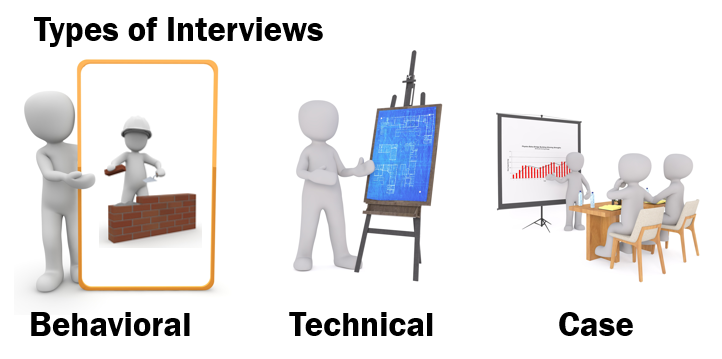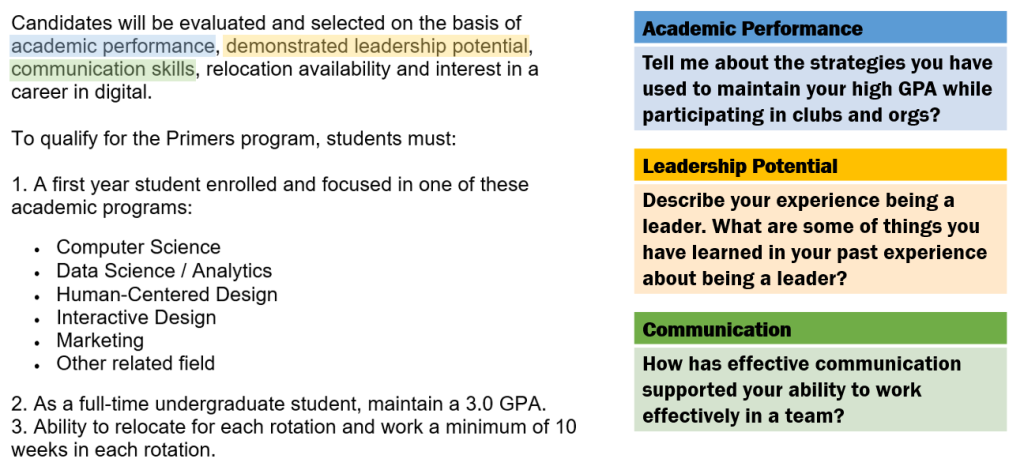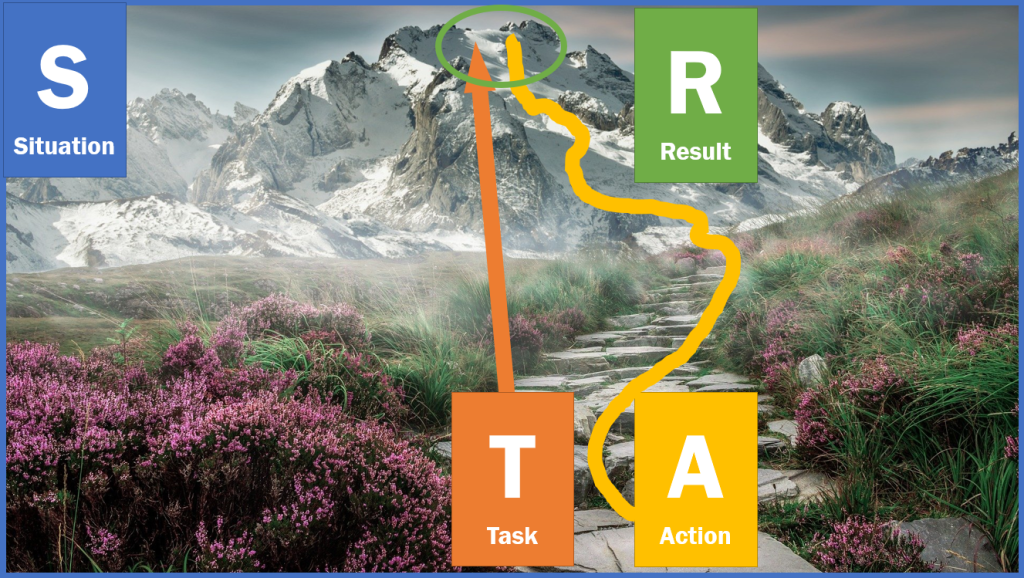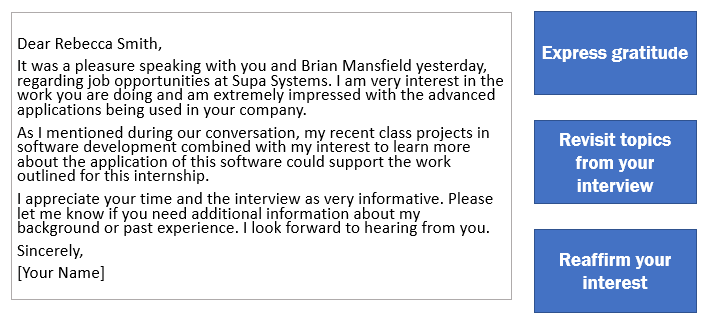You have made it this far! From your effective job searching, through the resume and cover letter you wrote as part of your application, through the waiting and speculating on your chances, to finally the email or phone call inviting you to an interview; you made it. Now, you may wonder, what do I do now?

In this article, I will focus primarily on interview set-ups in general, and specifically behavioral-based interviewing. For technical, case, and coding interviews, I will direct you to additional guidance on those. It is also important for you to review your rights and responsibilities as a candidate.
Behavioral Interviews
With a behavioral interview, the key to remember is simple: you are the subject-matter expert. As a first-year student, you may not feel like an expert in anything, but that is not true. There is no one on this planet (or in this universe) who is as knowledgeable about you as you are—and this is a critical component of a behavioral interview.
A behavioral interview is designed to assess your abilities relative to the job description. The interview will focus on your past experiences that demonstrate competencies or behaviors that support the work of the employer. You may already have an idea of what you are skilled at, so what matters now is to match your background and abilities to their needs. When I discussed your resume and cover letter, I used words like relevant and alignment to describe some ways to create a connection with your reader. Here, for interviewing, I want you to use the same ideas to connect with your interviewer.
Interview Preparation
Preparing for any interview requires planning, time, and effort. It may take you time to reflect on your past experiences so that you can recall aspects of your background that might be of interest to your listener.
Before
Since even before you applied, you have been preparing for the interview. Through realizing that your interview is another step in the application process, you can rely on the previous steps you have taken to further prepare for the interview.
Review the job description
I encourage you to save the text from each job you apply to as it can effectively support your interview process. Save the text of the job description in a separate document and not just the application URL, as they might remove the posting or close access to the job description after it closes and before the begin interviewing.
In addition to refreshing your memory about what the job requires, you can start to build prompts related to the role for your personal practice. For example:
“Candidates will be evaluated and selected on the basis of academic performance, demonstrated leadership potential, communication skills…”

By reflecting on how you demonstrate these attributes will make you feel better prepared to answer related questions and prompts. The job description is a good place to start and you can do similar preparation with information you received about the company as well.
Research the company
The job description can give you a lot of helpful information, but it may be helpful to look into the company as a whole. Review their website, see what they are recently in the news for, or talk with current/former employees. These may give you added ways to align yourself with their role.
You may also find interview tips and reviews on Handshake or sites like Glassdoor.
Practice makes proficient
There are different ways you can practice interviewing. The most common is to participate in a mock interview where someone simulates an interview by asking you questions and then providing feedback. CAPD and MIT Alumni Advisor’s Hub both offer mock interviews for you to gain practice and seek feedback. You can also do some simple things like recording yourself answering common interview prompts using your phone or webcam. As you play back the recording try to listen to yourself with an outside perspective and determine what is the best way to adjust your answer or approach.
Prepare
Given that interviews may take a variety of forms these days (from phone and video conferencing, to in person) you may need to adjust your approach based on the type of interview. Leading into the day of the interview, you may find it helpful to take the following steps:
- Allocate time. Do you need to travel? Do you need to change clothes or situate your video call backdrop? Regardless of the type of interview, plan to allocate time both before and after your interview so that you can make certain you can adequately focus during the interview. Whether the interview is online or in-person, time will help you feel a bit more at ease throughout the process.
- Be ready, early. Is your interview attire clean and ready? Do you have a strong internet connection and a quiet place to conduct a video call? Do you need to bring physical copies of your resume, portfolio, or other materials? Set-up a to-do list for what you may need to have ready prior to the interview.
- Stay calm/professional/polite. The stress of an interview might come from multiple sources: not being able to find parking, a bad internet connection, getting lost on your way to the site, or maybe even an intrusive roommate. You may not be able to control all of the outside stressors, but you can control how you might express them to others. Regardless of whether your stress is directly or indirectly related to the interview, stay calm, stay professional, and stay polite.
During
You arrived at the site, or you are in the waiting room of the conference call—in a few brief moments you are going to be in the interview. The format of most interviews is a conversation where the interviewer will ask you some questions or provide prompts, and you will respond. However, a lot of different things can happen during the interview, so keep flexible throughout the process.
Questions & Prompts
It may be tricky, but avoid feeling like your interview is an interrogation. This is an opportunity for you to share aspects of your background relative to the position. The interviewer has specific needs in mind when they are talking with you. So, you will always want to use your understanding of their needs to assess what is the right story to share, the right ability to showcase, or the right attribute to exhibit.
Introductory
Introductory questions and prompts are ways to get to know you a bit better in a concise, and relevant way. The most common one is “tell me about yourself” which allows you to provide a general overview of your background relative to the position in question. I like to think of this as a truncated prompt: “tell me about yourself as it is of interest to me (the interviewer)”. So, do not feel that you have to provide a verbal summary of everything that you have done. Instead, focus on the relevant attributes. In some instances, this is like an elevator pitch.
Other introductory questions and prompts include:
- Walk me through your resume
- Why are you interested in (position/company/industry)?
- What do you know about (company/industry)?
Behavioral
Behavioral interview questions are fairly easy to identify during the interview. Many of them are prompted by phrases such as
- Tell me about a time when…
- Describe your experience with…
- How have you done ___________ in the past?
Online, you can find a variety of sample questions that you can use to test your interview answers, but remember that the goal of a behavioral interview is to assess your abilities relative to the job description. Remember to use the job description to help you think of specific prompts related to the job.
Be a STAR

STAR stands for Situation, Task, Action, and Result. Think of it like a roadmap for a solid answer when it comes to behavioral questions/prompts. Since behavioral questions and prompts focus on past experience, STAR reminds you to:
S: describe the situation you were in
(On my recent backpacking trip through Europe…)
T: describe the task you needed to accomplish
(I wanted to climb to the top of this mountain…)
A: describe the action you took
(I had to plan…; I sought out a guide to help with…; I solved problems in…)
R: describe the results of your experience
(After 10 days, I successfully made it to the top; and I learned quite a lot from the experience…)
Provided that you have gone through each of the four components, you will have a solid foundation for your answer. The level of detail you provide is up to you, but find a balance between providing a clear illustration of your abilities without diving too deep into unrelated details.
Other questions and prompts
You may be asked a variety of additional questions and prompts throughout your interview. The nature of these questions and prompts will depend on different factors. They may include:
- Personal assessment: What are your strengths/weaknesses? Define success/define failure. What is your ideal job? What frustrates you at work?
- Ambitions/Plans: Where do you see yourself in five years? What qualities do you look for in a boss or manager? What are your ideas on salary?
- Company or “Culture” fit: What do you know about our work? How do you define success? Which section of the company do you have interest in working in? What type of environment are you most comfortable working in?
For more practice questions, check out this list:
Closings
These questions are typically at the end of the interview.
- Is there anything else we should know about you?
- What questions do you have for us?
Given how much variance you may encounter in an interview, I do recommend that you research questions associated with your specific organization through sites like Handshake and Glassdoor.
Time Management
There is a limited amount of time you have to interview and you will want to manage that time effectively. Some initial phone screens might be 20-30 minutes, and some final rounds may extend for a full day or more. Budgeting your time is an important aspect of the interview to make certain you have adequate opportunity to share your fit for the position. I recommend that you keep a watch, clock, or other time keeping device in easy view so that you can make certain to keep aware of how long you may take to answer a question or prompt, and the amount of time you have remaining.
Confidence
Prior to writing your resume or cover letter, chances are you reviewed the job description and told yourself “hey, I can do this!” Now that you have received a request for an interview, I want you to continue to have this faith in your knowledge, skills, and abilities as it pertains to this job. It’s easy to let negative thoughts and self-doubt creep in, but to counter those thoughts and feelings try to keep the following in mind:
Become your SME
You are the subject matter expert (SME) in an interview. In many instances, the interview is about you and your fit for a specific position. No one in the interview is more knowledgeable about you, than you. Familiarizing yourself about your own background, and the experiences that you have had, can be quite beneficial to use during the interview.
Reassess the power differential
It’s easy to feel inadequate when you approach the dynamic of an interview with “they have the job, and I want the job”—causing you to feel like you have to appeal to their authority. But remember, they are looking for someone with skills…and you have skills. They are looking for someone with new ideas…and you have ideas. They are looking for some who brings in energy…and you have energy. Avoid going in with a deficit mindset. They chose you for an interview because there was something about you that they thought was good.
Keep it conversational
Part of the nervousness you may feel around an interview may be partially due to the idea that you are perceiving it to be an interrogation. Although it may not be the classic film portrayal of a dark, grey room with two people demanding answers from you, you may feel that it might be quite similar. Sure, the interviewers are going to ask you questions, but you also have the ability to assess them in turn. Try to avoid the idea that this is going to be one-sided. Use the interview as an opportunity to determine whether you can see yourself working there: alongside the people who are interviewing you and in the culture that they convey.
Re-acquaint yourself with your friend oxygen
Talking for thirty minutes to an hour straight can knock the wind out of you, literally. As a result, part of your overall nervousness during an interview may feel akin to suffocating: lightheadedness, shortness of breath, and shallow breathing. Before, during, and after the interview, remind yourself to breathe. In some cases, you may find it helpful to do techniques like box breathing to help you stay present in the moment. Regardless of the style, making a conscious effort to breathe will help you feel better throughout the interview.
After
Although you may feel a bit a relief that you have just navigated your interview successfully, there are still things you should do to make the most of the interview:
Gratitude
Beyond being polite, a thank you note can be a great tool to use as part of your interview. You can send either a physical thank you note or an email. Through your note, you have the opportunity to express gratitude, revisit topics of conversation, and reaffirm your interest for the role.

You may not receive a response to your thank you note, but regardless it is a good way to move your candidacy forward.
Interview Timeline
Timelines will depend on a variety of factors. One question you may want to ask during your interview is “What is your timeline for hiring this position and when might I hear about next steps?” This way you have a good idea of what you may encounter and can plan ahead.
This is also a good reason to develop contacts within an organization (for example, through Alumni Advisors Hub). Having individuals who know what their timeline is, on the inside, can help you feel better about where you might be in the process.
Keep positive, keep up your search
An interview is a step, but it is not an offer. So, do not feel that you have something guaranteed until you have the official offer and keep up your search. By continuing to search until you have an offer, it will help distract you from wondering where you are in this search. Throughout the whole process, keep a positive outlook—the right position is out there and you might still need to do some searching for it.
Additional Resources
CAPD provides mock interviews for all students all year long. You can select “mock interview” as an appointment type in Handshake which usually takes about 50 minutes, or any career advising appointment if you just have questions. Please note that all mock interviews are behavioral, and unfortunately, we are unable to simulate a technical or case interview, or rather you may want to access better resources for the other two…
Which brings me to Alumni Advisors Hub. Alumni can be a great resource for mock interviews as well as they might be able to give you specific feedback related to their specific company or industry. If you are looking for support with a coding or case interview, alumni are a valuable resource.
I hope that this helps you feel a bit better prepared for your next interview. Remember that CAPD is always here to help!


